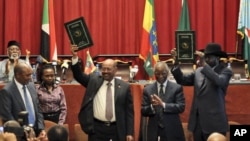The minority leader in South Sudan’s parliament, Onyoti Adigo Nyikwac, is embracing the deal announced Thursday between Sudan and South Sudan.
Nyikwac said it will build the trust and confidence that the two parties badly need in order to resolve remaining issues. But at the same time, he urged the ruling parties in Juba and Khartoum to include opposition parties in future talks, asserting that those unresolved issues will affect all South Sudanese people.
“The agreement is a step forward although it is a pie shell agreement," Nyikwac said. "My concern is the implementation of the agreements.”
The agreements focus on a new, demilitarized buffer zone and oil production. But the two sides made no progress on the disputed Abyei region located along the border of Sudan and South Sudan. And no accord was reached on oil-rich Heglig, over which the two sides clashed in April.
Nyikwac said the two issues left unresolved are key to a lasting peace.
“The borders issue and the Abyei issue [are] paramount, but what is most important is political commitment,” Nyikwac said. “The NCP [National Congress Party] and the SPLM [Sudanese People's Liberation Movement] were bitter enemies at the negotiations, but if they would have involved other political parties - because these are election issues - we would have been cheered by all the people.”
For example, Nyikwac said, South Sudan has offered Sudan $3.3 billion over two years for compensation in lost oil revenue. He argued that the opposition parties would have “raised South Sudan up,” by building schools, by providing good services, and making hydroelectric power.
“I think that is a very big amount of money,” Nyikwac said.
But Nyikwac acknowledges that South Sudan had to sign an agreement with Sudan in order to right its economy. He said they also signed a deal because of pressure from the international community, noting that if they did not, both Sudan and South Sudan faced sanctions.
“It is in favor of two countries to agree so that oil can start flowing again so that it will better their economic situations,” Nyikwac said.
Nyikwac said it will build the trust and confidence that the two parties badly need in order to resolve remaining issues. But at the same time, he urged the ruling parties in Juba and Khartoum to include opposition parties in future talks, asserting that those unresolved issues will affect all South Sudanese people.
“The agreement is a step forward although it is a pie shell agreement," Nyikwac said. "My concern is the implementation of the agreements.”
The agreements focus on a new, demilitarized buffer zone and oil production. But the two sides made no progress on the disputed Abyei region located along the border of Sudan and South Sudan. And no accord was reached on oil-rich Heglig, over which the two sides clashed in April.
Nyikwac said the two issues left unresolved are key to a lasting peace.
“The borders issue and the Abyei issue [are] paramount, but what is most important is political commitment,” Nyikwac said. “The NCP [National Congress Party] and the SPLM [Sudanese People's Liberation Movement] were bitter enemies at the negotiations, but if they would have involved other political parties - because these are election issues - we would have been cheered by all the people.”
For example, Nyikwac said, South Sudan has offered Sudan $3.3 billion over two years for compensation in lost oil revenue. He argued that the opposition parties would have “raised South Sudan up,” by building schools, by providing good services, and making hydroelectric power.
“I think that is a very big amount of money,” Nyikwac said.
But Nyikwac acknowledges that South Sudan had to sign an agreement with Sudan in order to right its economy. He said they also signed a deal because of pressure from the international community, noting that if they did not, both Sudan and South Sudan faced sanctions.
“It is in favor of two countries to agree so that oil can start flowing again so that it will better their economic situations,” Nyikwac said.




